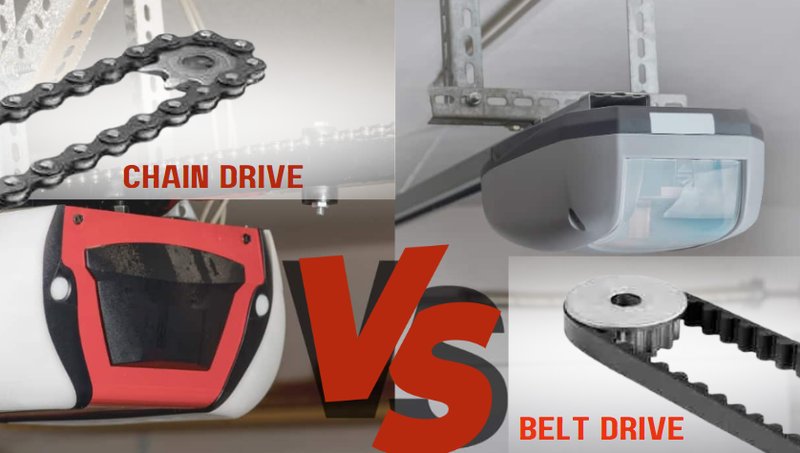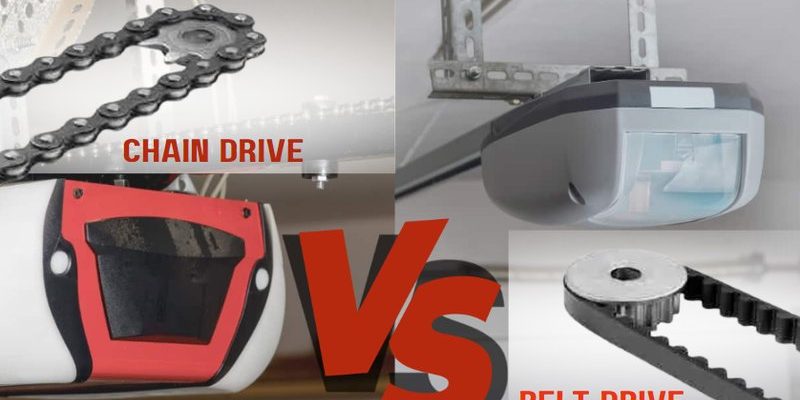
Understanding the essentials of these systems can feel a bit like navigating a new city. If you’re new to this, don’t worry—I’ll guide you through the twists and turns. Both types of garage door openers have their own strengths and weaknesses, and making the right choice depends on what matters most to you. Whether it’s keeping noise levels down or ensuring lasting durability, I’ll break down the details so you can make an informed decision.
What Is A Belt Drive Garage Door Opener?
A belt drive garage door opener uses a rubber belt to pull the door open and closed. This design makes it one of the quieter options available. Imagine a bicycle—when you ride it smoothly, it’s fairly silent, right? That’s pretty much how a belt drive operates. The rubber absorbs vibrations during movement, allowing for a gentler experience, especially if your garage is attached to your home.
They often come equipped with a DC motor, which enhances the smooth operation and reduces noise even further. So, if you have a bedroom or living space above your garage, a belt drive opener can be a game-changer. Brands like Chamberlain and LiftMaster have popular models that use this technology, known for their reliability and performance.
However, it’s worth mentioning that the initial cost of a belt drive system can be higher than that of a chain drive. This investment may pay off in comfort and peace, especially in noise-sensitive homes.
What Is A Chain Drive Garage Door Opener?
On the flip side, we have the chain drive garage door opener, which operates using a metal chain. Picture it like a robust bike chain—it’s built to handle heavy lifting. This type is perfect for more rugged applications, such as heavier doors or those in areas exposed to harsh weather.
Chain drive openers are typically less expensive upfront compared to belt drives. Brands like Genie and Wayne Dalton are known for their durable chain drive models. One drawback, though, is their noise level. As the metal chain moves over the sprocket, it can create quite a ruckus. If you’re garage is separate from your living areas, this might not be a significant concern, but it’s definitely something to consider.
One more point here: chain drives often require more maintenance than belt drives. Lubrication is key to keeping everything running smoothly, so if you don’t mind a little upkeep, these systems can be quite durable.
Noise Levels: Belt Drive vs. Chain Drive
When it comes to noise levels, belt drives reign supreme. Their rubber construction significantly reduces the clattering sounds associated with metal chains. If you envision your home as a serene oasis, opting for a belt drive is likely a wise choice.
In contrast, chain drives can be quite noisy during operation. You might feel like you’re revving up a truck every time you use your garage—definitely not ideal if you’re coming home late at night.
For a quick comparison, consider this:
| Feature | Belt Drive | Chain Drive |
|---|---|---|
| Noise Level | Very quiet | Moderately noisy |
| Best for | Attached garages, bedrooms above | Detached garages, heavy doors |
Ultimately, if you value a quiet garage experience, the belt drive wins hands-down.
Durability: Belt Drive vs. Chain Drive
Now let’s discuss durability. Chain drives are known for their strength, built to last many years even under heavy use. The metal chain is sturdy and can withstand the test of time in various conditions. If you’ve got a heavier door or frequent use, chain drives can handle that wear and tear.
On the other hand, belt drives, while quiet and smooth, may not be as tough as their chain counterparts. That said, many models are quite durable and can last for years if properly maintained. For example, if a belt drive opener is used within recommended limits, it can serve you well in everyday scenarios without much hassle.
Here’s a side-by-side look at durability:
| Feature | Belt Drive | Chain Drive |
|---|---|---|
| Durability Score | Moderate | High |
| Maintenance Needs | Low | Moderate |
Depending on your needs, if you’re looking for something that can handle a rough environment, a chain drive might be the way to go.
Cost Comparison: Upfront and Long-Term
Let’s talk dollars and cents. Your garage door opener choice will impact your budget, both upfront and in terms of long-term value. Generally, belt drives tend to be pricier due to their advanced technology and quieter operation.
However, the lower maintenance needs can balance that initial cost. You won’t be spending extra on repairs or replacements as frequently, keeping your long-term expenses in check.
In contrast, chain drives are usually budget-friendly right off the bat. But if you don’t mind rolling up your sleeves for a bit more maintenance, this could still save you money in the long run.
Installation Process: What to Expect
Installation can feel like a daunting task, but understanding the differences in installation can help clarify things.
Belt drives often come with detailed instructions to make installation smoother. They’re relatively straightforward and can be done as a DIY project if you’re handy.
Now, chain drives may require a bit more work. The heavier components mean ensuring everything is secure and properly aligned. If you’re not comfortable with power tools or ladders, you might want to consider hiring a professional for this kind of opener.
Let’s weigh it out:
| Feature | Belt Drive | Chain Drive |
|---|---|---|
| Installation Complexity | Moderate | High |
| Time Needed | 1-3 hours | 2-4 hours |
Both installations can be completed with some patience and a steady hand, though your skill level will factor into the equation as well.
Compatibility with Remotes
When choosing a garage door opener, consider the compatibility with your remote controls. Most modern openers, whether belt or chain drive, can sync with various remotes. Brands often have their own remote systems, but many openers offer the convenience of universal remotes, which can work across different brands, making your setup easier.
Using a universal remote can save you the trouble of replacing lost or broken remotes. You might be wondering about syncing; thankfully, it’s a straightforward process. Generally, you’ll press buttons on both the remote and the opener to establish that connection.
That said, ensure any remote you choose is compatible with your unit—check the specifications to avoid any compatibility issues down the line.
Choose Based on Your Lifestyle
At the end of the day, which opener you choose comes down to your lifestyle and preferences. If you prioritize noise reduction and comfort, especially in homes where peace is essential, then a belt drive is likely the best suited for you.
On the other hand, if you’re looking for a more budget-friendly, rugged option that can take a beating, then a chain drive would be right up your alley.
Consider your garage door type, space, and how often the door will be used. What works for you might not work for someone else, so personalizing this decision is crucial.
Choosing between a belt drive and chain drive garage door opener doesn’t have to be stressful. Each has unique benefits and disadvantages, and assessing your needs will guide you in making the best decision.
Whether it’s the whisper-quiet operation of the belt drive or the durable vigor of the chain drive, you have everything you need to make an informed choice. Take your time in considering what’s best for your space, lifestyle, and budget, and you’ll surely be satisfied with your decision for years to come. Your garage door opener is just one part of your home, but it plays a key role in your daily life.
